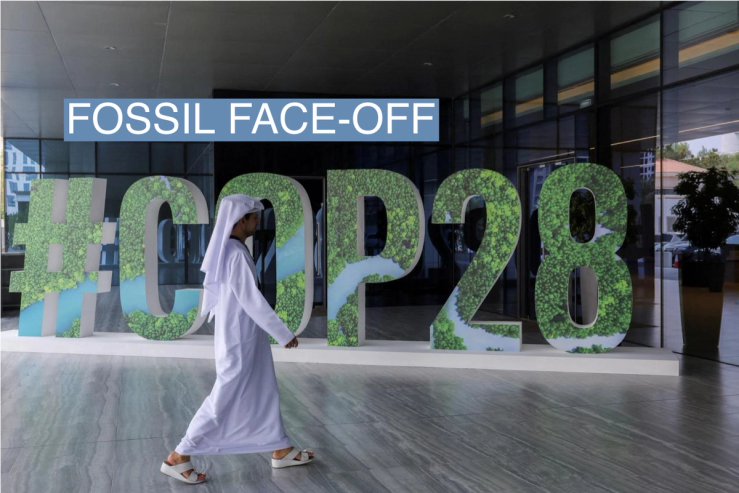The News
U.S. climate envoy John Kerry and his Chinese counterpart Xie Zhenhua wrapped up five days of one-on-one talks this week, with Kerry tweeting afterward that the two “reached common ground on a number of issues” ahead of the COP28 climate summit in Dubai.
The closely-watched meeting didn’t deliver any specific new policies but set the stage for the high-stakes summit where the odds of reaching a consensus on the most important climate solutions appear slim.
Tim’s view
There’s always a mismatch between the expectations pinned on COP (short for Conference of the Parties to the U.N. Framework Convention on Climate Change) and what it can realistically achieve, given that most major decisions require the unanimous consent of every country.
Since the adoption of the Paris Agreement in 2015, COP hasn’t really been about negotiating a sweeping new treaty. Instead, delegates haggle over details left over from Paris, pressure each other to set more ambitious national climate goals, and craft a carefully-worded statement to be published on the summit’s last day that sums up their hopes for the global energy transition. Activists are virtually certain to leave disappointed, and analysts are virtually certain to note that the world isn’t doing enough.
Still, a common refrain at any COP is that if the summit didn’t exist, it would have to be invented, since it’s the only global climate forum we’ve got. Here are the key topics on the table at COP28:
Fossil fuel phaseout: Should fossil fuels be phased “out” or “down”? Over what timeline? And can they continue to be used if paired with “abatement” technology to capture the emissions? There’s a mountain of evidence from the International Energy Agency and others that the “business as usual” forecast for the production and consumption of fossil fuels is fundamentally incompatible with the Paris goals. That reality is running headlong into governments’ paranoia about energy security and the economic interests of major producers — including the summit’s Emirati leadership, who are vocal advocates for the ongoing use of “abated” fossil fuels.
This fight will ultimately boil down to a few choice words in the final statement, but the signal this sends about how aggressively governments are willing to move against the legacy energy system will be one of the summit’s most impactful takeaways. Less controversial will be the possible adoption of a global goal to triple renewable energy capacity by 2030, which at least 60 countries have voiced support for.
Climate reparations showdown: The biggest outcome of COP27 in Egypt was that countries agreed to create a “loss and damage” fund to channel payments from rich, high-emissions countries to poorer, climate-impacted ones. Over the last year a small committee of negotiators has tried to bang out the details, a process that ended acrimoniously last weekend with a deal no one seems to like. The U.S. demanded that contributions be voluntary, and insisted on housing the new fund in the World Bank, which many developing countries objected to because it would give them less oversight and make the money harder to access.
“It was never about justice, and this loss and damage fund will not deliver it,” said Lien Vandamme, a senior campaigner at the Center for International Environmental Law. The fight will continue at COP28, where the committee’s deal needs to be ratified by the full group. Negotiators will also discuss, but probably not adopt, a new goal for climate finance fundraising to replace the long-established $100 billion annual target that rich countries still haven’t hit.
Carbon markets rulebook: The Paris Agreement’s Article 6 created two global markets for the trade of carbon offset or removal credits, one for bilateral one-off trades between countries and another an open, U.N.-administered marketplace in which companies, countries, or even individuals could be buyers. The wonkiest track of every subsequent COP has been the negotiations over specific rules for these markets, which remain unresolved. It’s not clear how the markets will interact with the existing global carbon market, how (or even whether) to prevent buyers and sellers from both counting the same credit against their carbon footprints, and if certain kinds of fraud-prone credits from forestry projects will be allowed in.
The details can bore even diehard climate policy nerds, but there are billions of dollars at stake in terms of profit for project developers and the transfer of finance from polluters in the global north to vulnerable communities in the global south, so hopes are high for a resolution at COP28 that allows the markets to start working — without drowning in greenwashing.
Room for Disagreement
One area where there might be more tangible progress is among subnational governments. This COP will be the first to feature a dedicated sub-summit for mayors and governors, who can often move more decisively and effectively than presidents and prime ministers. Cities are the source of 70% of global emissions, so there’s a lot they can do on their own.
The View From China
The COP process is ultimately only as effective as what individual countries bring to the table. This year, as usual, all eyes will be on China. It released this week a methane reduction plan that, while vague, sets a precedent for other countries and fossil fuel companies to follow suit. And on Friday the country’s electric grid regulators published new rules for coal-fired power plants that will probably extend their lifespans but could make it easier to integrate a higher volume of renewable power.
China and the U.S., while ostensibly on the same page on climate action, are still at loggerheads vis-a-vis clean-energy trade, and forthcoming U.S. tax rules that will likely block Chinese companies from accessing electric-vehicle tax credits will strain relations further. China has also taken pains to frame itself in climate talks as a developing country, in part to avoid pressure to pay climate finance — but could find itself unwelcome in that caucus if it pushes too hard against a fossil fuel phaseout.
Notable
- Fossil fuel lobbyists and consultants will be lurking behind every door at COP28. An AFP investigation this week found that McKinsey is helping the United Arab Emirates draft talking points for an “energy transition narrative” that sees a long lifespan ahead for oil.


